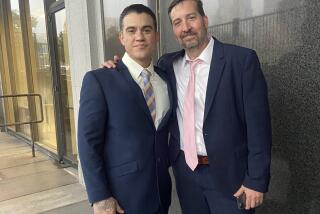Supreme Court Voids Murder Conviction, Cites ‘Serious Misconduct’ by Prosecution
- Share via
SAN FRANCISCO — Citing “serious misconduct” by prosecuting authorities, the state Supreme Court on Monday overturned the second-degree murder conviction of a San Diego insurance executive accused of arranging the fatal beating of an attorney in 1981.
The justices, in a unanimous 93-page opinion, ordered a new trial for Herman G. Martin, a 66-year old former federal informant found guilty in the death of Richard Crake, a La Jolla lawyer he was opposing in a bitter lawsuit over $100,000 Martin claimed he was owed.
The court, upholding the findings of a retired appellate justice specially appointed to investigate the case, concluded that officials had improperly intimidated three defense witnesses by immediately and publicly arresting the first witness who testified for the defendant.
The justices found also that the three witnesses--two of whom were convicted felons--were further discouraged by warnings that they too would be prosecuted if they gave testimony that was self-incriminating.
But the court, in an opinion by Justice Stanley Mosk, refused to order the charges against Martin dismissed.
“(Martin) fails to establish that the prosecutorial misconduct that occurred here, although undeniably serious, was sufficiently outrageous or gross to justify the (dismissal) he seeks,” Mosk said.
Prosecutors expressed dismay with the action but pledged to retry Martin, despite the inherent difficulties of getting witnesses in a 6-year-old case back in court.
San Diego County Dist. Atty. Edwin L. Miller said he was “thoroughly frustrated” by the decision but refused to blame the new, more conservative court. The justices, he said, as a practical matter, had little choice but to accept the special findings of retired Appellate Justice Gerald A. Brown in August, 1986.
“My indignation is not with the court but with the process which saw a referee appointed by the (former Chief Justice) Rose Bird Supreme Court (who) simply accepted as fact every point made by the defendant,” Miller said.
Brown’s report, upholding defense claims of prosecutorial misconduct, was “just bunk,” Miller said.
State Deputy Atty. Gen. Louis Hanoian said he was “saddened by the result” in the case but staunchly defended the trial prosecutor, James Pippin.
“I’ve never seen a better-tried case,” Hanoian said. “His conduct was exemplary, and he did a great job.”
Set Aside
Charles M. Sevilla of San Diego, Martin’s attorney, said he thought the misconduct had been serious enough to warrant dismissal but said, nonetheless, he was gratified the conviction had been set aside.
Martin, who has been free on $250,000 bail pending the outcome of the appeal, was “pleased--but also a little disappointed that this thing apparently will continue,” Sevilla said.
“This has been a nightmare for him,” the attorney said.
Martin had been protected by federal authorities and given a new identity for his testimony against racketeers in the New York City garment industry in the mid-1970s.
In 1981, San Diego authorities charged Martin with forcing Andrew Powell, an employee in his insurance company, to beat up Crake to collect the money he said the attorney owed him. Powell went to Crake’s home and during an altercation bludgeoned the lawyer to death with a gun.
Denied Wrongdoing
Powell pleaded guilty and testified against Martin, saying that Martin had given him the gun he used in the crime. Martin denied wrongdoing and at trial, called a witness, Stephen Aguilar, who testified Aguilar provided Powell the gun.
Immediately after he left the stand and passed through the courtroom doors, Aguilar was arrested as an accessory to murder by prosecution investigator Lawrence K. Wilson. News reporters and a group of prospective defense witnesses saw the arrest. But the charge was later dropped.
Three other witnesses that the defense said would contest Powell’s story all refused to testify. Martin’s lawyers said the witnesses were improperly discouraged from testifying because of threats by prosecutor Pippin and investigator Wilson that they, like Aguilar, would be prosecuted for any crimes they revealed on the stand.
More to Read
Sign up for Essential California
The most important California stories and recommendations in your inbox every morning.
You may occasionally receive promotional content from the Los Angeles Times.










